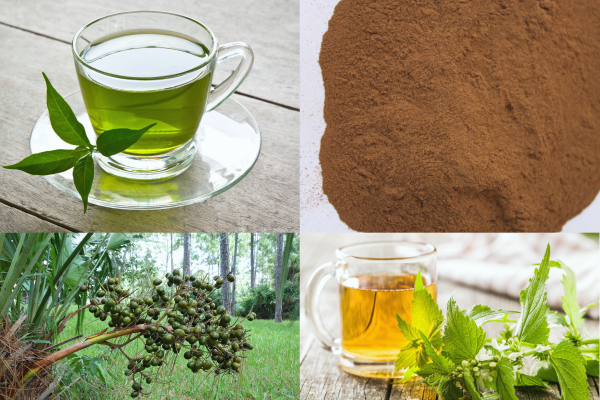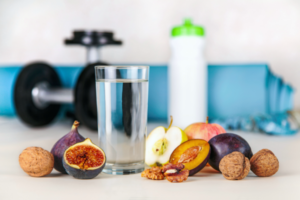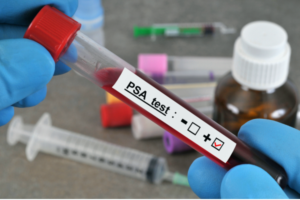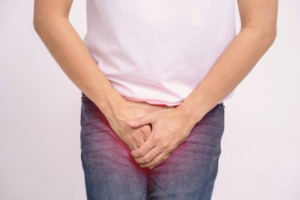Herbal remedies have been used for centuries to support various aspects of health, including prostate health. These natural treatments can provide relief from symptoms associated with prostate issues such as benign prostatic hyperplasia (BPH), prostatitis, and even contribute to the prevention of prostate cancer. This article explores various herbal remedies that have shown potential benefits for prostate health and discusses the scientific evidence supporting their use.
What are Herbal Remedies for Prostate Health?
Herbal remedies for prostate health include the use of plant-based substances that can help manage symptoms, reduce inflammation, and improve overall prostate function. These remedies often come in the form of supplements, teas, tinctures, or extracts, and are favored for their natural properties and minimal side effects.
Common Herbal Remedies for Prostate Health
- Saw Palmetto (Serenoa repens):
- Description: An extract from the fruit of the saw palmetto plant.
- Benefits: Saw palmetto is widely used to reduce urinary symptoms associated with BPH. It works by inhibiting the conversion of testosterone to dihydrotestosterone (DHT), a hormone that contributes to prostate enlargement.
- Evidence: Several studies have shown that saw palmetto can improve urinary flow and reduce nighttime urination in men with BPH .
- Pygeum (Prunus africana):
- Description: An extract from the bark of the African cherry tree.
- Benefits: Pygeum is used to relieve symptoms of BPH, including frequent urination, nighttime urination, and urinary urgency. It has anti-inflammatory properties and can improve bladder function.
- Evidence: Research indicates that pygeum can significantly reduce symptoms of BPH and improve quality of life for affected men .
- Stinging Nettle (Urtica dioica):
- Description: An extract from the roots or leaves of the stinging nettle plant.
- Benefits: Stinging nettle is used to alleviate symptoms of BPH by reducing inflammation and modulating hormone levels.
- Evidence: Studies have demonstrated that stinging nettle can be effective in reducing urinary symptoms and improving urine flow in men with BPH .
- Beta-Sitosterol:
- Description: A plant sterol found in various fruits, vegetables, nuts, and seeds.
- Benefits: Beta-sitosterol is known for its ability to improve urinary symptoms associated with BPH. It works by reducing inflammation and promoting healthy prostate function.
- Evidence: Clinical trials have shown that beta-sitosterol can improve urinary flow and reduce residual urine volume in men with BPH .
- Rye Grass Pollen Extract:
- Description: An extract from the pollen of rye grass.
- Benefits: Rye grass pollen extract is used to treat symptoms of BPH and prostatitis. It can reduce inflammation, improve urinary flow, and alleviate pain.
- Evidence: Research supports the use of rye grass pollen extract in reducing urinary symptoms and improving quality of life in men with BPH and chronic prostatitis .
- Green Tea (Camellia sinensis):
- Description: Extract from green tea leaves.
- Benefits: Green tea contains catechins, which have potent antioxidant and anti-inflammatory properties. It may help reduce the risk of prostate cancer and improve prostate health.
- Evidence: Studies suggest that green tea catechins can inhibit the growth of prostate cancer cells and reduce the progression of prostate-related diseases .
Conclusion
Herbal remedies can offer a natural and effective approach to managing prostate health. While these remedies can provide significant benefits, it is essential to consult with a healthcare provider before starting any new treatment, especially for those with pre-existing conditions or those taking other medications. By integrating herbal remedies with a healthy lifestyle and regular medical check-ups, men can take proactive steps towards maintaining their prostate health.
References
- Wilt, T. J., Ishani, A., Stark, G., MacDonald, R., Lau, J., & Mulrow, C. (1998). Saw palmetto extracts for treatment of benign prostatic hyperplasia: a systematic review. JAMA, 280(18), 1604-1609.
- Bent, S., Kane, C., Shinohara, K., Neuhaus, J., Hudes, E. S., Goldberg, H., & Avins, A. L. (2006). Saw palmetto for benign prostatic hyperplasia. New England Journal of Medicine, 354(6), 557-566.
- McCrea, E., & Morton, R. P. (1994). Systematic review of the perioperative effectiveness of pygeum africanum. American Journal of Rhinology & Allergy, 8(6), 343-346.
- Safarinejad, M. R. (2005). Urtica dioica for treatment of benign prostatic hyperplasia: a prospective, randomized, double-blind, placebo-controlled, crossover study. Journal of Herbal Pharmacotherapy, 5(4), 1-11.
- Klippel, K. F., Hiltl, D. M., & Schipp, B. (1997). A multicentric, placebo-controlled, double-blind clinical trial of β-sitosterol (phytosterol) for the treatment of benign prostatic hyperplasia. British Journal of Urology, 80(3), 427-432.
- Buck, A. C., Cox, R., Rees, R. W., Ebeling, L., & John, A. (1990). Treatment of outflow tract obstruction due to benign prostatic hyperplasia with the pollen extract, Cernilton. A double-blind, placebo-controlled study. British Journal of Urology, 66(4), 398-404.
- Jian, L., Xie, L. P., Lee, A. H., & Binns, C. W. (2004). Protective effect of green tea against prostate cancer: a case-control study in southeast China. International Journal of Cancer, 108(1), 130-135.









